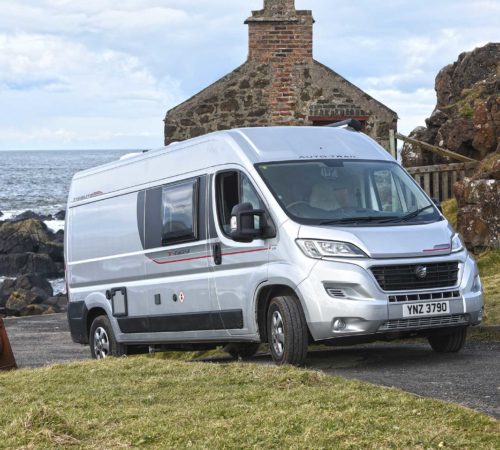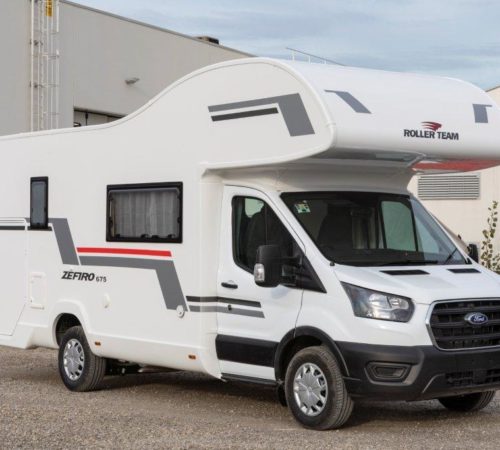Top Family Attractions in Northern Ireland
How to keep the kids amused? It’s probably the number one question on the minds of every parent embarking on a family camper van trip. But fear not! One of the reasons Northern Ireland makes such a perfect camper van touring location is the sheer diversity of family attractions on offer.
Top Family Attractions in Northern Ireland
How to keep the kids amused? It’s probably the number one question on the minds of every parent embarking on a family camper van trip. But fear not! One of the reasons Northern Ireland makes such a perfect camper van touring location is the sheer diversity of family attractions on offer. No matter what direction you choose to take on your road trip lying in wait are fun-filled family days guaranteed to put a smile on everyone’s face (whatever the age of those on board). So if you’re looking for things to see and do that will be a shared experience for you and the kids, here’s a few pointers from Causeway Campers. To make it even easier to plan your tour, or put together an itinerary, we’ve compiled a list of the top family attractions in Northern Ireland.
BELFAST:
Titanic Belfast is situated at the very heart of the Titanic Quarter, just a short walk from the city centre. Housed in an architecturally stunning Visitor Centre, Titanic Belfast tells the story of the world’s most famous ship using the very latest technology. Also in the shadow of the Harland & Wolff shipyard cranes is W5 Science & Discovery Centre, an award-winning inter-active attraction that positively encourages young (and old) to touch, feel, and even smell. The kids will get a real kick out of W5’s Rogue Robots laser activity.
On the north-eastern slopes of Cave Hill lies Belfast Zoo one of the city’s oldest and most popular visitor attractions. In existence since 1934 and housing some 1000 animals and 150 different species, it’s also worth checking out the recently opened Adventurers Playground with its Crocodile Creek and Meer Cat Mound. It’s quite a hike so a comfortable pair of shoes is recommended. Belfast Castle enjoys fantastic views of Belfast Lough and the city. From its prominent site on Cave Hill (there are five caves in the side of the cliffs, one known locally as Napoleon’s Nose is said to have inspired Jonathan Swift’s Gulliver’s Travels) it provides superb parkland, myriad species of wildlife, and an adventure park to tire youthful limbs.
South Belfast’s 26-acre Botanic Gardens is where you’ll find the Ulster Museum, an Aladdin’s Cave of fascinating collections, including dinosaurs (show me a kid who doesn’t like dinosaurs!) and an Egyptian mummy. If pottering around a museum is a little too sedate, then why not check out Barnett’s Demesne Mountain Bike Trails, a fairly recent addition to the city’s attractions and boasting Ireland’s first purpose built jump park.
COUNTY ANTRIM:
Carnfunnock Country Park is positioned at the gateway to the nine famous Glens of Antrim at Ballygally, near Larne. With its close proximity to Larne and Belfast harbours, this wooded wonderland’s caravan and camping facilitiesmake it an ideal base from which to tour. Sure it even has ‘fun’ in its name and no wonder with wonderful walking trails, a fun zone, a miniature,bungee running, remote control trucks/boats, and much, much more.
Or how about following in the footsteps of giants? The Giant’s Causeway (near the village of Bushmills) is Northern Ireland’s most popular tourist attraction with more than three quarters of a million visitors every year. The UNESCO World Heritage Site now boasts a superb new Visitor Centre that showcases the science behind the causeway’s amazing 40,000 interlocking basalt columns – and of course the legend of giant Finn McCool. On the same stretch of awe-inspiring Antrim coastline lies Carrick-a-Rede Rope Bridge. Slung across a chasm 23-metres deep and 20 metres wide, it was first erected 350-years ago so local fishermen could access their salmon nets. Is your family up for the challenge?
Dunluce Castle is yet another of the country’s iconic landmarks, perched at the cliff’s edge on the approach to the seaside resort town of Portrush. The ‘Port’ has long been a popular tourist destination and Barry’s Amusements, Northern Ireland’s largest theme park, a rite of passage for generations of kids. If that doesn’t fill your daily quota of fun and frolics, a short distance away lies Waterworld, an indoor attraction with a range of features includinga water playground, six slides, and water cannons.
Last, but by no means least, is The Gobbins near Islandmagee. Twenty miles north of Belfast on the famed Causeway Coastal Route, this spectacular white-knuckle walking path skirts the ocean. First enjoyed by visitors during the Edwardian era, this rejuvenated and redeveloped collection of bridges, tunnels, caves, and paths provide a unique and exhilarating experience.
COUNTY LONDONDERRY/DERRY:
Northern Ireland’s second city, Londonderry/Derry [European City of Culture 2013], is one one of Europe’s finest examples of a walled city. Derry’s Walls, built in the early 17th century, are a reminder of the city’s rich and often divisive history (that includes not one, not two, but three sieges). Dominating the skyline, the walls are a perfect starting point to explore what the city has to offer. Located within the historic walls is the award-winning Tower Museum, with permanent exhibitions showcasing the story of Derry and the Spanish Armada shipwreck ‘La Trinidad Valencera’. Derry’s Guildhall, with its neo-Gothic styling and stunning stain glass windows, underwent a £9.5m restoration in 2013 to include a multi-faceted tourism experience.
Mussendun Temple is another of the country’s iconic landmarks. Sitting on a cliff top, high above the Atlantic Ocean and stunning Downhill beach, it was built in 1785 as a library and modelled on the Temple of Vesta in Italy. Just a few miles further along the coast and you will arrive at Bienvenagh, officially designated: An Area of Outstanding Natural Beauty. At the western tip of the Antrim Plateau, Bienvenagh offers visitors truly magnificent panoramic views and the opportunity for some holiday snaps with the statue of mythical sea god Manannan Mac Lir. Also nearby (on the approach to Castlerock) sits Hezlett House, a traditional thatched cottage dating back to 1690.
If all that scenery and history is too much for the younger generation, then why not let them blow off some steam at The Jungle, Moneymore, an innovative outdoor adventure venue that includes Northern Ireland’s largest paintballing site and zorbing (that’s hurtling down a hill inside an inflatable ball to you and me!).
COUNTY DOWN:
The Ulster Folk & Transport Museumin Cultra (on the Bangor Road) allows you to step back in time and experience life as it was a century ago. Visitor guides in full period costume demonstrate traditional crafts as you wend your way along the location’s beautiful 170-acres of rolling countryside. One of Europe’s largest transport collections. Staying with the transport theme, why not pay a visit to Downpatrick & County Down Railway and travel to Inch Abbey and King Magnus’ Grave on board a vintage steam train.
Mount Stewart (a 19th century house owned by The National Trust) has recently undergone an £8m restoration that has returned the house to its former glory. The paths and accompanying gardens (voted amongst the top ten gardens in the world) are an idyllic spot for a picnic. Castlewellan Forest Park challenges the family to find its way out of what is the world’s largest permanent maze, and at Pickie Fun Park in Bangor the biggest test will be stamina levels as you flit from steam train to giant pedal swans, splash pad to 18-hole nautical-themed mini golf course.Or if getting close to nature is what floats your boat, then set your sights on the Castle Espie Wetland Centre (Comber) with its Secret Swamp, an active play experience for children.
COUNTY FERMANAGH:
The Marble Arch Caves(Florence Court, Enniskillen) is a UNESCO designated Global Geopark site. Another ‘must see’, you will be guided through a fascinating underworld of passages and chambers, rivers and waterfalls. Like nearby Castle Coole, Florence Court House is run by The National Trust. Set in the foothills of Cuilcagh Mountain, the 18th century house and estate was formerly home to the Earls of Enniskillen. The grounds contain the famous Florence Court Yew, said to be the origin of all Irish Yew trees (plus a children’s playground and picnic area).
On the scenic shores of Upper Lough Erne, Crom Estate is one of Ireland’s most important conservation areas. The sprawling 2000-acre demesne contains ancient woodland, tranquil islands, estate cottages, Old Crom Castle, a children’s play area, and wildlife exhibition. Keep an eye out for the wild deer!
Beleek Pottery is one of Northern Ireland’s oldest and most fascinating attractions. Established in 1857, at Beleek Visitor Centre you can watch skilled craftsmen create the world famous porcelain. Voted Best Visitor Experience in the 2014 Northern Ireland Tourism Awards. Or how about something quirky? Headhunters Barber Shop & Railway Museum (Enniskillen)…yes, you read it correctly. The Johnston family’s decision to combine their traditional barbers shop with a lifelong fascination with local railway led to the creation of this exhibition like no other. Admission is free to the Railway Museum. A quick short back and sides is optional.
COUNTY TYRONE:
The Ulster American Folk Park (Castletown, Omagh)brings to life the incredible story of Irish emigration to America.Re-live the journey from the rural thatched cottages of Ireland to the Atlantic crossing on board (a full scale) emigrant ship, and on to the log cabins of the New Frontier. Original buildings from both sides of the Atlantic have been painstakingly re-created (or in some cases actually re-located), adding to this outdoor museum’s authenticity. Or why not take the kids to the nearby Mellon Fun Farm with its impressive selection of rare breed animals and large indoor play area.
Gortin Glen Forest Park is situated at the gateway to the Sperrin Mountains.Featuring a five-mile long drive with breath-taking views, the park contains horse riding facilities and an enclosed deer herd. Todds Leap is a multi award-winning activity centre in Ballygawley. There are more than 20 activities available to visitors, including off road driving, clay pigeon shooting, zipline, paintballing, and archery.
Staying with outdoor pursuits, the River Blackwater Canoe Trail (Dungannon)and Blessingbourne Mountain Bike Trail cater for even the most energetic families. The former meanders through the countryside of both Tyrone and Armagh, before exiting at Lough Neagh; and at Blessingbourne there are trails to suit the technically advanced rider and novice alike.
COUNTY ARMAGH:
The sky really is the limit at Armagh Planetarium with a unique visitors’ experience encompassing digital theatre, inter-active displays, scale models of space probes, and the largest meteorite on display in Ireland. Or why not take one giant step for your family and walk around the Astropark with its scale model of the Universe. With your feet back on terra firma perhaps the delights of Slieve Gullion Forest Park are more your style. A sturdy pair of walking boots are recommended if you and the kids want to make the most of the various mountain trails, with views of the Ring of Gullion, Mourne Mountains, and Armagh Drumlins.
Navan Fort (Killylea Road, Armagh) is one of the great sites of pre-Christian Ireland and royal seat of the King’s of Ulster. Here children can experience life as an Iron Age Celt, even getting their hands dirty digging in the Archeo-pit. The Argory, bordering the River Blackwater, provides an illuminating insight into more recent history. Built in the 1820’s, and surrounded by a 320-acre wooded estate, this former home of the MacGeough/Bond family will appeal to equine lovers with the stable yard, carriages, and harness room.Armagh County Museum lifts the lid on life in this historic cathedral city. Collections range from local history to fine art, natural history to archaeology.
Or why not try something different? Perhaps the Tayto Factory is more to your taste. The 500-year-old Tayto Castle, originally the home of the O’Hanlon clan, is where one of Northern Ireland’s best loved snack brands is made. We have Thomas Hutchinson to thank for these tasty morsels. A local businessman, he started making crisps on the site in 1956 as a method of financing much-needed repairs to the castle. Kids get the opportunity to meet the brand’s mascot Mr Tayto and see how the crisps are made.



